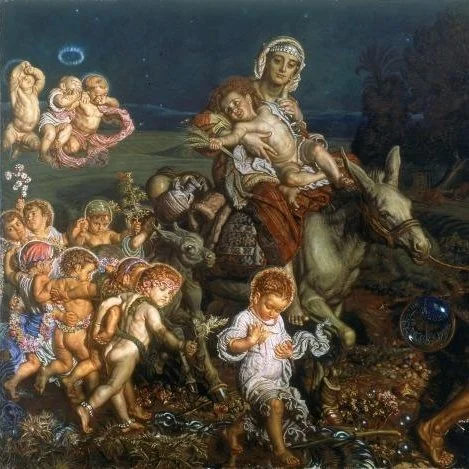It is of faith and is expressed in the Apostles' Creed according to the Ordo Romanus, that Christ descended into hell, and it is afterward declared that His soul descended there, but He did not abolish hell.
This mystery is expressed in St. Peter's sermon on Pentecost Day, in which he quotes the words of the Psalmist as referring to Christ, namely, "Thou wilt not leave My soul in hell," and he says: "The prophet... foreseeing this, spoke of the resurrection of Christ, for neither was He left in hell, neither did His flesh see corruption."
St. Paul also says of Christ: "Ascending on high, He led captivity captive; He gave gifts to men. Now that He ascended, what is it, but because He also descended into the lower parts of the earth? He that descended is the same also that ascended above all the heavens, that He might fill all things." Did Christ's soul really and substantially descend into hell and not merely effectively; and then was this descent fitting; and what hell was this, and whom did He deliver? St. Thomas gives and exemplifies the answers of tradition.
First Article
Christ's soul really and substantially descended into hell and not merely effectively. The Apostles' Creed says: "He descended into hell,"which obviously and naturally means a real and substantial descent. Similarly St. Paul says: "He also descended first into the lower parts of the earth. He that descended is the same also that ascended above all the heavens, that He might fill all things," Likewise St. Peter says, quoting the Psalmist: "Because Thou wilt not leave My soul in hell, nor suffer Thy holy one to see corruption." The Fathers thus understood this text, especially St. Ignatius, St. Gregory Nazianzen, and St. Augustine.
St. Thomas explains that Christ's soul did not descend into hell by that kind of motion whereby bodies are moved, but as the angels are moved. And Christ's separated soul was not inoperative in hell, for it operated as the instrument of the divine nature, expelling exterior darkness and illuminating this place.
Second Article
It Was Fitting For Christ To Descend Into Hell.
There are three reasons for this.
1) Because man by sin had incurred not only death of the body, but also descent into hell. Therefore it was fitting for Christ to die and descend into hell, so that He might deliver us from the necessity of permanent death (because we shall rise again) and from descent into hell. In this sense Christ is said to have power over death and in dying to have conquered it, according to the prophet, who says: "O death, I will be thy death."
2) It was fitting for the devil to be overthrown by Christ's passion, so that He should deliver the captives detained in hell.
3) As He showed forth His power on earth by living and dying, so also it was fitting for Him to manifest it in hell, by visiting it and enlightening it; and so at the name of Jesus every knee should bow, not only of them that are in heaven, but likewise of them that are in hell.
Third Article
Christ did not actually descend into the hell of the lost; because, as the Fathers teach, He descended into hell to console and liberate those who were detained there. But nobody is consoled and liberated in the hell of the lost, as will at once be stated. Moreover, the hell of the lost is not a fitting place for Christ. Therefore He descended into the hell of the lost only effectively, arguing with them and convincing them of their infidelity and malice; and this He did by speaking to them or manifesting His will by signs, because local distance is no impediment for spirits.
Fourth Article
Christ's soul remained in hell, namely, in the limbo of the holy fathers, until the moment of His resurrection. Hence the Church in the blessing of the paschal candle, sings: "This is the night wherein Christ ascended victorious from hell." Such is the opinion of St. Irenaeus, St. Gregory of Nyssa, and Tertullian.
Fifth Article
Christ, descending into hell, delivered the holy fathers. He delivered them from the penalty of original sin, namely, from the penalty whereby they were excluded from the life of glory, of whom the prophet says: "Thou also, by the blood of Thy testament, hast sent forth Thy prisoners out of the pit wherein is no water," And St. Paul says: "Despoiling the principalities and powers," ] namely, the infernal ones, by taking away the just, He brought them from this place of darkness to heaven, that is, to the beatific vision. Such is the opinion of the Fathers, especially St. Augustine and St. Gregory the Great and St. Jerome.
Thus Christ's descent into hell was the cause of exceeding joy to those souls already purified, such as the souls of Abraham, Isaac, Jacob, Moses, the prophets, as also many just and holy women of the Old Testament. Thus we clearly see that the whole of the Old Testament was not an immediate preparation for eternal life, but for the coming of the Redeemer, who after having suffered and died, had to open the gates of heaven, so that we might enter into eternal life. The first and most abundant fruits of the sacrifice on the cross are also made manifest. Then, too, the fathers of the Old Testament fully understood that the passion of Jesus was the source of all graces, and that without it they could neither have been justified nor have merited an increase of grace, nor obtained eternal life. Therefore they were most sincerely thankful to the Savior whose coming they awaited for many centuries, who is called "the desire of the eternal hills, the joy of the angels, the King of patriarchs, the Crown of all the saints, ."
By the mystery of the holy Incarnation, by the labors of Jesus, by His agony and passion, by His infirmities, and by His death they were liberated. In all these things they saw the most perfect fulfillment of what had been announced and the truth that the mystery of the redemptive Incarnation far transcends all figures, all sacrifices of the Old Law, all prophecies. Christ's descent into hell truly meant for them, "it is consummated."
All these things proclaim the glory of the cross.
Sixth Article
Christ did not deliver any of the lost by His descent into hell; because, since Christ's descent into hell operated in virtue of His passion, He liberated only those whom He found united to His passion by means of faith that is actuated by charity. But the lost did not believe in Christ's passion and they were not finally united with Christ by charity, and after death there is no possibility of conversion, because the lost are confirmed in evil, as the just are in good.
Seventh Article
For the same reason, the children who died in original sin were not liberated by Christ. Baptism is administered to men in this life, wherein man can be changed from sin to grace. But Christ's descent into hell was granted to the souls after this life, when they are no longer capable of this aforesaid change.
Eighth Article
Christ did not deliver all the souls in purgatory by His descent into hell.
For Christ's passion did not have greater power then than now. But now it does not free all souls in purgatory, but only those that are sufficiently cleansed, or to whom Christ's passion is applied by the Sacrifice of the Mass. Christ's descent into hell was not satisfactory; it operated, however, in virtue of the Passion; thus He did not free all those who, when still living united with their bodies, had merited by their faith and devotion toward Christ's death, that by His descent there, they should be freed from the temporal punishment of purgatory, as St. Thomas says.
Some theologians, however, said that Christ's descent, although it did not of itself free all souls from purgatory, there was then granted to them the favor of a quasi-plenary indulgence, which is a probable opinion. Yet the commentators of St. Thomas follow his view, and furthermore say that the souls in purgatory that were not then liberated, were consoled and also rejoiced at the thought of the glory they will at once receive after their purgation.




There are lots of fake quotes going around.